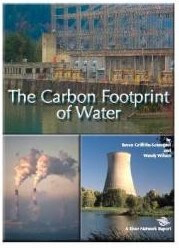The Carbon Footprint of Water
 The decisions being made today regarding the management of water and energy resources will profoundly affect our economic and environmental future. Climate change and other stresses are limiting the availability of clean water and affordable energy. A large amount of energy is expended to supply, treat and use water, meaning that water-oriented strategies can result in significant reductions in energy use and greenhouse gas emissions.
The decisions being made today regarding the management of water and energy resources will profoundly affect our economic and environmental future. Climate change and other stresses are limiting the availability of clean water and affordable energy. A large amount of energy is expended to supply, treat and use water, meaning that water-oriented strategies can result in significant reductions in energy use and greenhouse gas emissions.
The Carbon Footprint of Water explores the energy and carbon emissions embedded in the nation’s water supplies. In this report, River Network has developed a baseline estimate of water-related energy use in the United States, as well as a comparative overview of the energy embedded in different water supplies and end-uses. The report also includes numerous examples of how water management strategies can protect our freshwater resources while reducing energy and carbon emissions.
This information is intended to help river and watershed groups, policy makers and water managers understand the magnitude of water related energy use and evaluate the potential to reduce carbon emissions through water conservation, efficiency, reuse and low impact development strategies.




